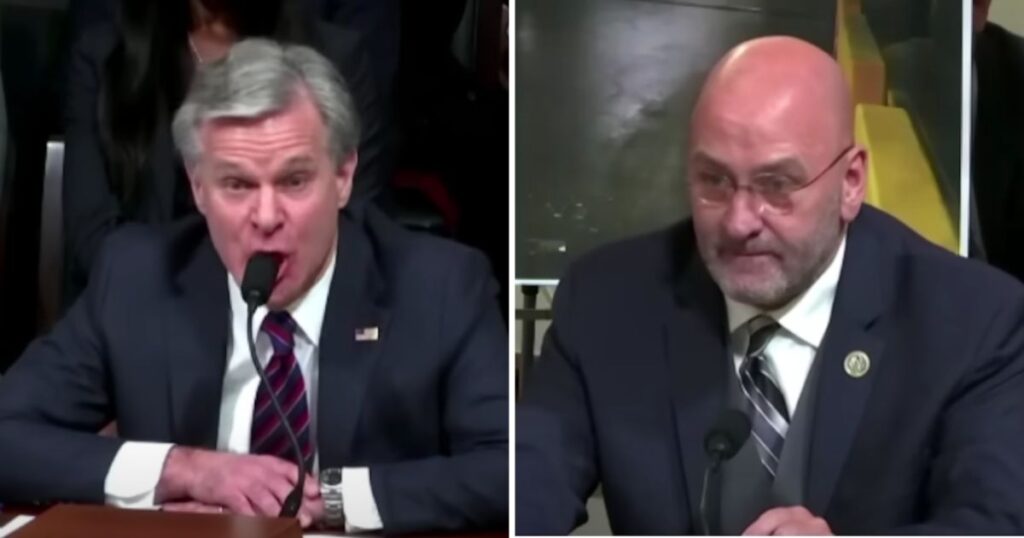In recent months, Representative Clay Higgins of Louisiana has taken a confrontational stance towards FBI Director Christopher Wray, particularly in regard to the agency’s actions surrounding the January 6, 2021, Capitol riot. During a House Homeland Security Committee hearing, Higgins issued a stark warning to Wray to remain closely associated with Washington, D.C., as he might be called to answer for the events of that day. Emphasizing the suffering of families impacted by the incident, Higgins suggested that Wray and other officials, including House Speaker Nancy Pelosi, would face repercussions for their roles in what he views as a setup of innocent individuals during the Capitol protests. Higgins, expressing a belief in the inevitability of justice, underscored that Wray’s actions are deserving of the same scrutiny and accountability directed at the various families affected by the consequences of January 6.
Higgins has gained prominence for his assertive questioning of Wray, particularly regarding the FBI’s alleged infiltration and management of the events that took place during the Capitol protests. His inquiries have been partly fueled by revelations of confidential human sources present at the Capitol that day. In November 2023, Higgins confronted Wray with photographic evidence of suspicious buses he claims transported these government operatives to the protest. This visual documentation sparked further inquiries regarding the bus occupants. The congressman highlighted the odd nature of the buses, which he described as “ghost vehicles,” meaning they were painted over and stripped of identifying marks, raising questions about their legitimacy and purpose.
Higgins’s investigation delves into the specifics of the day’s events. According to his claims, the first buses arrived at Union Station several hours before the rally, and eyewitness accounts from fellow charter bus drivers suggested unusual behavior surrounding those vehicles. Notably, he recounted how the buses were empty of passengers upon arrival, an anomaly in the charter bus industry that typically sees drivers socializing and interacting when parked. This led Higgins to believe that something clandestine was happening with the occupants of these buses, particularly after it was reported that a group of individuals, described in military terminology as “huddling,” disembarked shortly after.
During a separate interview, Higgins conveyed a strong conviction that the occupants of these suspicious buses were either undercover FBI agents or confidential informants, asserting a high degree of certainty in his claims. He articulated a belief that there were possibly “actual FBI agents” among these operatives rather than mere informants. His analysis suggests a layered approach wherein informants might be utilized for smaller groups, while more significant factions, such as the Proud Boys, would likely involve FBI agents. This belief fed into Higgins’s larger narrative of sophisticated surveillance and infiltration tactics utilized by the FBI against American citizens participating in political protests.
The ongoing scrutiny from Higgins toward the FBI and the Department of Justice reflects a broader sentiment among certain political factions who argue that governmental overreach jeopardizes individual freedoms and due process. Higgins has publicly declared his intention to pursue accountability for those perceived as architects of a disproportionate response to the January 6 protests, echoing a sentiment that is gaining traction in certain conservative circles. He emphasized that high-ranking officials within the FBI should be held accountable for what he presumes may be abuses of power and violations of constitutional rights.
In conclusion, Representative Clay Higgins continues to position himself as a vocal critic against what he deems governmental malpractice in relation to the January 6 events. With a mix of personal conviction and investigative resolve, he has called into question the FBI’s actions on that day while promising to pursue consequences for those that engaged in what he believes to be manipulative tactics against Trump supporters. Higgins’s concerns about the violation of civil liberties and the integrity of electoral processes resonate with a segment of the American populace, framing a narrative of resistance against perceived governmental oppression that may have lasting implications in the political discourse surrounding accountability and transparency in law enforcement agencies.

